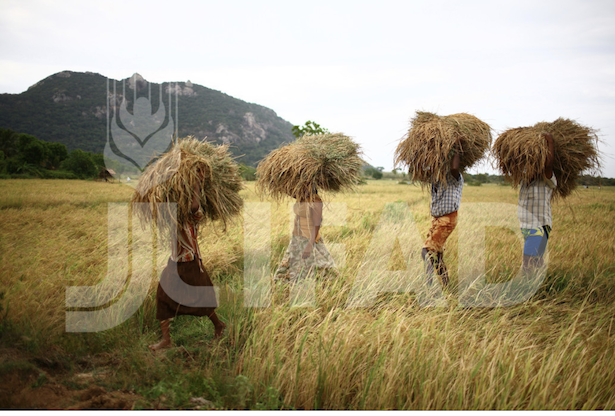Impacts of Ukraine conflict on food security already being felt in the Near East North Africa region and will quickly spread, warns IFAD

Rome, 17 March 2022 – As the war continues to rage in Ukraine, impacts of rising food prices and shortages of staple crops are already being felt in the Near East and North Africa region and spreading to the world’s most vulnerable countries, including in the Horn of Africa, with poorest people at greatest risk, warned the UN’s International Fund for Agricultural Development (IFAD) today. This comes amidst mounting concerns by the international community that the ongoing conflict will escalate global hunger and poverty.
A quarter of global wheat exports come from Russia and Ukraine. Forty percent of wheat and corn from Ukraine go to the Middle East and Africa, which are already grappling with hunger issues, and where further food shortages or price increases risk pushing millions more people into poverty. Russia is also the world’s largest fertilizer producer. Even before the conflict, spikes in fertilizer prices last year contributed to a rise in food prices by about 30 percent. IFAD’s analysis looks at the impact that the war will have on already poor small-scale producers and rural communities.
“I am deeply concerned that the violent conflict in Ukraine, already a catastrophe for those directly involved, will also be a tragedy for the world’s poorest people living in rural areas who cannot absorb the price hikes of staple foods and farming inputs that will result from disruptions to global trade,” said Gilbert F. Houngbo, President of IFAD. “We are already seeing price hikes and this could cause an escalation of hunger and poverty with dire implications for global stability.”
IFAD’s analysis shows that price increases in staple foods, fuel and fertilizer and other ripple effects of the conflict are having a dire impact on the poorest rural communities. For example:
- In Somalia, where an estimated 3.8 million people are already severely food insecure, the costs of electricity and transportation have spiked due to fuel price increases. This has a disproportionate impact on poor small-scale farmers and pastoralists who, in the face of erratic rainfall and an ongoing drought, rely on irrigation-fed agriculture powered by small diesel engines for their survival.
- In Egypt, prices of wheat and sunflower oil have escalated due to Egypt’s reliance on Russia and Ukraine for 85 percent of its wheat supply and 73 percent of its sunflower oil.
- In Lebanon, 22 percent of families are food insecure and food shortages or further price hikes will exacerbate an already desperate situation. The country imports up to 80 percent of its wheat from Russia and Ukraine, but can only store about one month’s worth of the crop at a time due to the blast in Beirut’s port in 2020 that destroyed the country’s major grain silos.
- Central Asian countries that rely on remittances sent home by migrant workers in Russia have been hit hard by the devaluation of the Russian ruble. In Kyrgyzstan, for example, remittances make up more than 31 percent of the GDP, the majority of which comes from Russia. Remittances are crucial for migrants’ families in rural areas to access food, education and other necessities.
IFAD’s experts stress that small-scale producers are already reeling from the impacts of the COVID-19 pandemic, droughts, cyclones and other natural disasters. Their incomes are expected to be affected by the rising cost of inputs, reduced food supplies and disrupted markets. This is also likely to have devastating and long-term impacts on their nutrition and food security.
IFAD is working closely with governments, rural communities and other partners and exploring ways to step up global support to the regions most affected, including building on its Facility for Refugees, Migrants, Forced Displacement and Rural Stability (FARMS), which supports agricultural livelihood opportunities for refugees and host communities. It is also intensifying its work to reduce post-harvest losses, improve storage and strengthen local and regional food markets.
“IFAD is committed to increasing the resilience of the world’s poorest rural people who are critical for producing a third of the world’s food. We must do all we can to ensure they have the resources to keep producing food and be protected from additional shocks,” said Houngbo. “In the short-term, however, it will be difficult to mitigate the global impacts of this crisis. I join the UN Secretary-General’s call to end the conflict now and restore peace. It is the only solution to avert global catastrophe.”
IFAD’s experience during previous food crises shows that interventions such as stabilising local market systems, cash transfers, strengthening remittances, setting up savings and loans groups, training and subsidies for agricultural enterprises, and value chain investments (including infrastructure, support for microfinance institutions, aggregation services that link farmers to markets) are effective in building resilience and reducing the impact of shocks. IFAD will draw on this experience and its unique expertise as an International Financial Institution and UN rural development agency to guide its response to the current crisis.
END
IFAD invests in rural people, empowering them to reduce poverty, increase food security, improve nutrition and strengthen resilience. Since 1978, we have provided US$23.2 billion in grants and low-interest loans to projects that have reached an estimated 518 million people. IFAD is an international financial institution and a United Nations specialized agency based in Rome – the United Nations food and agriculture hub.





